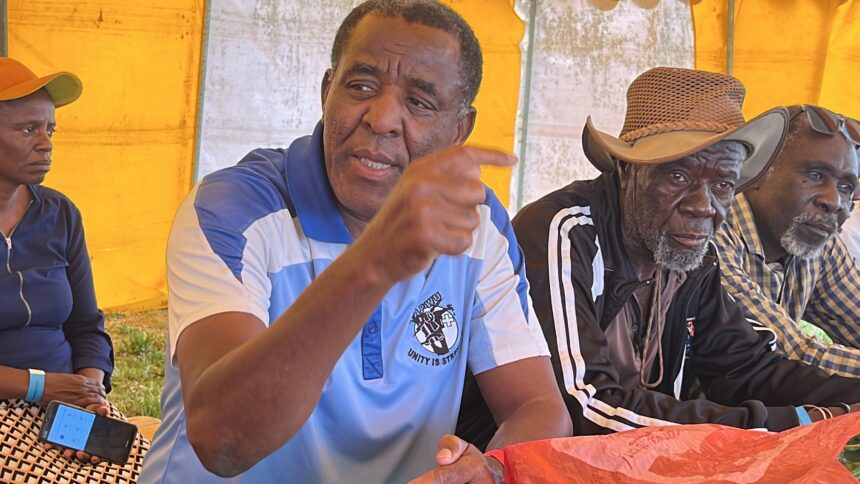KARIBIB – Small-scale miners say their existence in the mining industry is being threatened by exclusive prospecting licenses (EPLs) issued by the Ministry of Mines and Energy.
Their claims are frequently rejected in favour of EPL holders, particularly large companies, which obstructs their ability to work on claims they have been mining for years.
Small-scale artisanal miners extract semi-precious stones such as tourmaline, aquamarine, topaz, amethyst, garnet, and quartz crystals. They operate with basic tools, such as picks and shovels, to extract the semi-precious stones.
New Era caught up with several small-scale miners during an engagement with the ministry at the Okulac Festival in Karibib recently, where they expressed their discontent.
They believe the current mining laws are discriminatory, as they are often branded illegal miners.
“Our great-grandparents mined in these areas. This was their way of surviving. We learnt it from them, but our existence is being threatened. The Erongo Mountains have been and are a great source of income for us, the small miners, who have been digging for precious stones (gemstones) and minerals in the area. We have been mining the area for close to 30 years, and in that period, we had been able to, among others, sustain ourselves, our families, and other dependents. Can the laws not be changed?” asked Lukas Martin, who has been mining in the Daures constituency.
The existing legal framework allows EPLs to overlap their claims, creating a sense of unfairness.
He feels they are being sidelined, and that the current system favours large corporations, leaving them with fewer opportunities to fend for themselves.
Petrus Haakuria, a long-time miner, expressed concern about the uncertain future of small-scale miners, stating how EPLs have pushed miners out of their traditional mining areas. “You find an unregistered area and confirm with the ministry. But once you peg and try to register it, you’ll be told there’s an EPL. This forces us back to stealing. These EPLs are killing us,” he
said.
Lazarus Kangombe, who has been working in the Karibib area since 2002, shared similar sentiments. He said he was denied registering a claim in favour of an EPL. “Lithium has caused a lot of problems for us, and we want the ministry to look into this,” he added.
Michael Jimmy, another small-scale miner, said with limited job opportunities in the region, small-scale mining is often the only viable option for many people.
“We really need to reconsider our approach to claims and EPLs in our area,” he urged.
He suggested the ministry should adopt a more lenient approach towards claim holders. “These people pay all these fees just to be told, ‘No, you cannot do this,’” he said.
Miner Andreas Eixab described how their claims were being allocated to EPL holders despite miners’ long-standing presence in the area. “Once we do the hard work, someone comes and claims the mine as theirs. We were told no claims should be given on the mountain, yet we’ve been working there for years,” he remarked.
Philemon Thaniseb echoed similar frustrations, saying his claim was established before an EPL was introduced in the same area.
“I got my claim when there were no EPLs, but someone applied for an EPL afterwards and it was granted. We have a section that says claims cannot be set up where there’s an EPL,” he explained.
He now feels neglected by the ministry.
Kangombe also expressed frustration at losing mining claims to others. “I applied for claims but later, I was told the claim belonged to someone else. They sit and wait for small miners to send their coordinates, then someone gets access to the information we submit and they give it away,” he said. “How can this happen? How do you tell me I can’t get it, but you give it to someone else?” he asked.
Karu Tjimbira also expressed his frustrations about the difficulties in obtaining relevant documents to mine or register claims.
“While the licence fee is not expensive, the logistics involved make getting it costly. Sometimes you only have enough to pay for the service you need. However, at times we are forced to travel all the way to Windhoek to access these services. They can even tell you to come back tomorrow without considering the financial implications for us small miners,” he said.
Response from the Ministry
In response to these concerns, Florence Hoebes, senior administration officer at the ministry of mines, acknowledged the miners’ grievances during the engagement.
She said, the challenges faced by small-scale miners are valid. She assured them that changes are being made to the current Act. “The laws are not in favour of small-scale miners, but it is important that you organise yourselves so we can see how to resolve your issues,” she advised.
“If we don’t follow the current laws, EPL holders will take the ministry to court, and the legal system will want to know what the Act says and whether we are following it,” she noted.
Standing committee recommendations
Last year, the Parliamentary Standing Committee recommended that the ministry establishes differentiated fee structures for local small-scale miners to prevent their exclusion from the mining sector.
“This approach should consider technology, equipment, environmental protection, and mining claim acquisition, as well as operations. The ministry should also aim to reduce transportation costs to Windhoek and facilitate participation in trade fairs, exhibitions, and mining indabas,” the committee recommended.
It advised that the ministry enhance the capacity of small-scale miners to understand the licensing system and legal procedures.
The committee recommended that the ministry decentralises the licensing process to regions with mining activities to assist small-scale miners in accessing markets. “The ministry should also explore integrating EPL and mining licence applications so they may be issued simultaneously, which would enhance the efficiency of the process.
Potential investors often request a mining licence before committing funds,” the committee added.
-edeklerk@nepc.com.na



